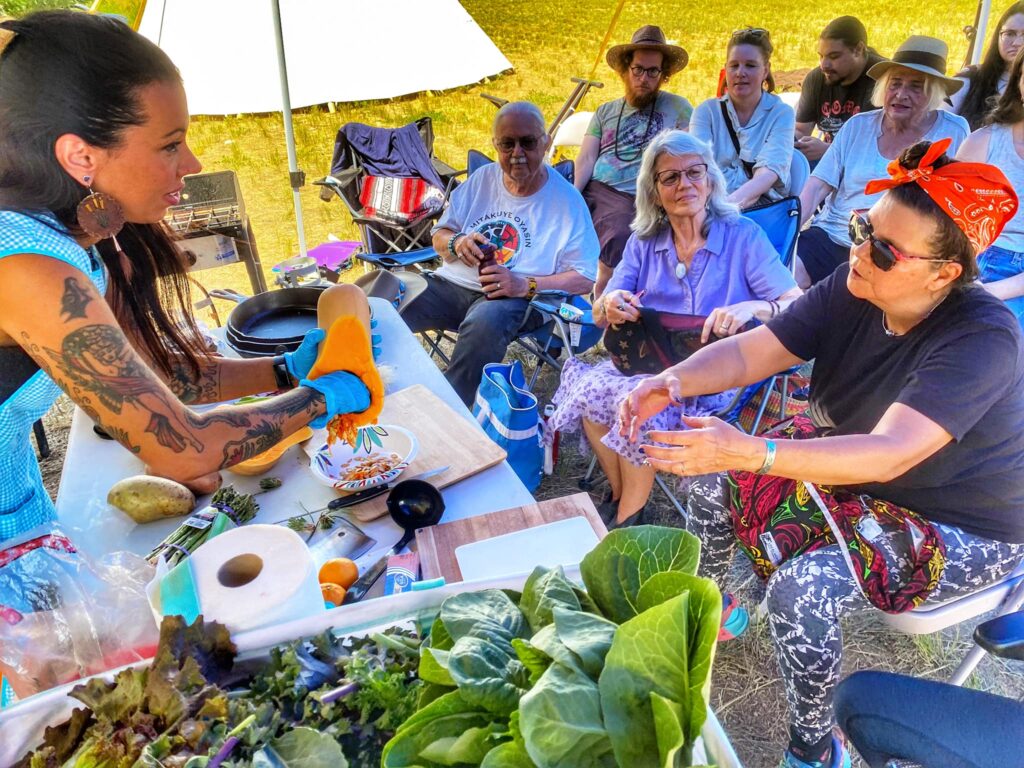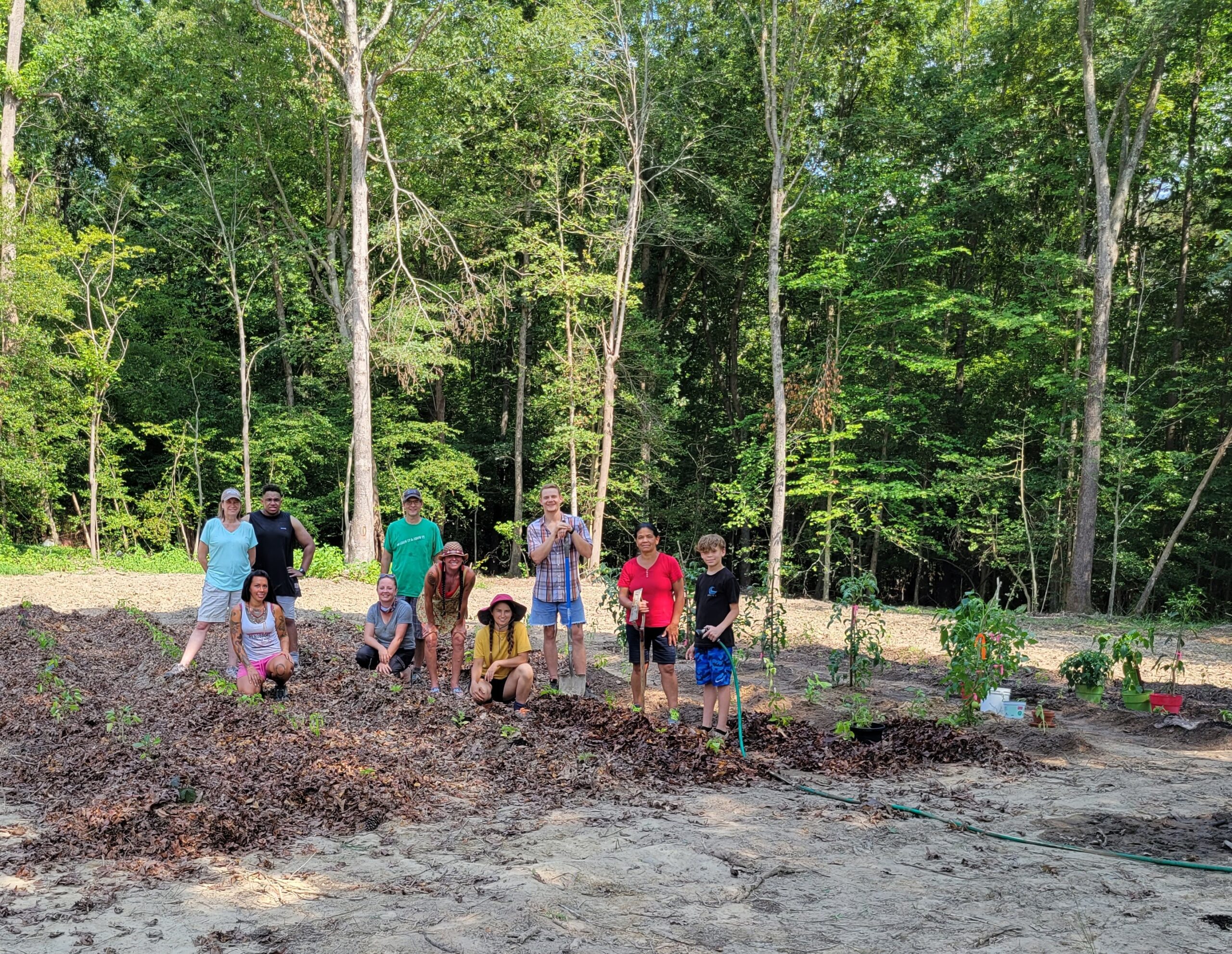Seeds of Change:
Cultivating Community and Sustainability at Virginia Free Farm
by Charlie Li

Amyrose Foll, executive director of Virginia Free Farm, answers questions during one of her many visual presentations (submitted photo).

Virginia Free Farm has been a valuable asset in educating the younger generation throughout the area (submitted photo).
In the heart of Virginia, a revolutionary project is taking root that aims to redefine the relationship between communities and the food they consume. Virginia Free Farm (VFF) – an initiative grounded in the principles of sustainability, equity, and education – is not just a farm; it’s a movement. Spearheaded by a group of dedicated individuals, the farm is on a mission to address food insecurity by providing free, healthy, and locally-grown produce to those in need. In doing this, they are also able to foster a deeper connection to the land and traditional agricultural practices. VFF is a non-profit homestead farm located at 178 Broad Street Road in Kents Store, VA. The organization originally started as a retail and wholesale farm and transitioned into a non-profit during the COVID-19 pandemic.
VFF also provides a variety of other services such as educational support, technical assistance, controlled burns, livestock donations, firewood donation and much more.
With a tight network of partner farms and other non-profits (six partner farms, 18 community gardens spanning from Charlottesville to Richmond, and a network of free fridges), VFF is able to quickly gather resources and distribute them in an efficient manner to those in need.
VFF’s mission extends beyond just growing food; it’s about cultivating community resilience and empowerment. The farm acts as a hub for locals to learn, share and support one another. Their free fridges, for example, are more than just food distribution points; they are symbols of communal care and mutual aid for one another. Through these efforts, VFF is knitting a tighter community fabric, one that is capable of supporting its most vulnerable members and ensuring that no one goes hungry.
Along with distributing to the local communities surrounding Kents Store, VFF also provides seeds and plants to tribal growers and mutual aid organizations all across the United States. Virginia Free Farm gains a lot of support from seed donors such as Southern Exposure Seed Exchange and Seed Savers Exchange.

Seasonal seed swaps held by Virginia Free Farm have garnered a large turnout from visitors both near and far (submitted photo).

Along with seed and plant donations, Virginia Free Farm also handles livestock donations for those who are interested in raising chicks, ducks, and goats (submitted photo).
From these partners, VFF is able to provide conventional seeds for vegetables similar to those at a local grocery store. However, they are also able to provide obscure cultivars of culturally-significant seeds from native peoples of the east coast. These seeds are then able to be shared back to tribes that originally stewarded these varied seeds, as many of them have become unavailable or lost to these native peoples.
This entire enterprise is spearheaded by executive director Amyrose Foll. With an intensive career throughout her life including time spent in the U.S. Army, working as a nurse, and employed as a firefighter, Foll said she finds joy in helping others.
“Growing up, my family’s native, so our wealth isn’t measured in what we have, but how much we give away,” she explained. “I’m a caregiver at heart, and that’s probably why I went from nursing into a completely different field, but in the same way, I’m still taking care of people and helping people. It’s kind of a way to hold onto that for personal fulfillment.”
Foll’s dedication to serving her community is evident in every aspect of VFF’s operations. From providing food to those in need to educating others about sustainable farming practices, she and the team at VFF are making a tangible difference in the lives of countless individuals. Their commitment to equity, education, and sustainability sets them apart as leaders in the fight against food insecurity and advocates for a more just and sustainable future.
Creating such a successful network of partner farms and other non-profit organizations didn’t come without its challenges and struggles. “At first, it was brutal, because I was trying to do everything from planting, production, packing and delivery myself,” Foll explained.
“Logistically, the distribution was difficult and crazy. And I started having people contact me, and then we got in touch with Taylor [Scott] from RVA Community Fridges,” she continued. “We were filling some of her fridges, which made it easier, because people could come and go and take what they wanted as they needed.”
Partnering with other nonprofits such as Blessing Warriors RVA – a nonprofit dedicated to aiding those who are unsheltered and in need of support – has helped with both distribution and preparation of the fresh produce from VFF. While the supply is being met, the preparation of meals from other partners is crucial in creating edible and delicious meals for those depending on these volunteer-run organizations. With support from organizations such as these, VFF has been able to build a strong community with people from all different walks of life in the Louisa, Spotsylvania, and Fluvanna areas.

Virginia Free Farm workers help out at the the Rappahannock Tribal Center Forest Garden (submitted photo).
VFF has also participated in educational events at nearby schools and programming in the gardens of housing projects in Charlottesville. The non-profit is dedicated to educating the younger generation on the importance of agriculture and locally-sourced produce.
“I thought they didn’t want to do it. It was just going to be a way to give the moms a break for an hour after school,” Foll recalled. “And I created a swarm of children that wanted to eat vegetables right out of the garden, which is awesome, because there’s not easy access to grocery stores right in that area. A lot of families in that area don’t have reliable transportation, so we brought the grocery store to them.”
Community outreach and volunteers play a major role in keeping organizations such as Virginia Free Farm strong. Signing up to volunteer is fairly simple. On the VFF website, after scrolling down to the “Volunteer Service Sundays” category and clicking on “HELP OUT,” those interested can choose from volunteer jobs such as seed packing and assisting at the Community Roots Garden in Richmond.
As one learns about the story of Virginia Free Farm, it becomes evident that this initiative is more than a farm. Through its innovative approach to agriculture, commitment to education, and unwavering support for food security, VFF embodies the essence of what it means to serve and uplift a community. The farm’s success is a testament to the power of collective action and the profound impact of nurturing the land and its people with respect and compassion.
Amyrose Foll and her team, alongside a dedicated network of volunteers and partners, have demonstrated that it is possible to address complex challenges such as food insecurity and environmental sustainability through grassroots efforts. The practices and principles embraced by VFF offer valuable lessons in resilience, stewardship, and the importance of giving back. This all echoes Foll’s belief that true wealth is measured not by what we have, but by what we are able to give away.
As VFF continues to grow and evolve, its mission serves as a guiding light for other communities striving to create a more equitable and sustainable future. The story of VFF is not just about the food it provides or the land it cultivates; it’s about building a stronger, more connected community where everyone has the opportunity to thrive.The journey of Virginia Free Farm is far from over, but its impact is already immeasurable. It stands as a vibrant model of what is possible when compassion, innovation, and community come together to tackle the pressing issues of our time.

